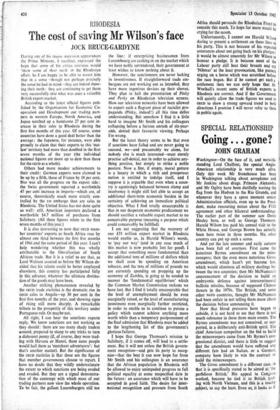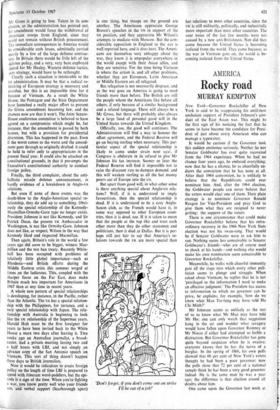Going . . . gone?
SPECIAL RELATIONSHIP JOHN GRAHAM
Washington—On the face of it, and notwith- standing Lord Chalfont, the special Anglo- American relationship is very much alive. Only this week Mr Stonehouse has been in Washington talking about aeroplanes and Mr Jenkins about drugs. Princess Alexandra and Mr Ogilvy have been dutifully waving the flag from the Hudson to the Rio Grande, and whenever they have a spare moment senior Administration officials, even up to the Presi- dent, make reassuring noises about the F111 agreement and other bilateral understandings. The earlier part of the summer saw Denis Healey here, as well as George Thomson. Harold Wilson has paid his annual visit to the White House, and George Brown has actually been here twice in three months. No other country can put up such a score.
And yet the late summer and early autumn have been full of sourness. First came the notorious. Byrnes amendment on the mine- sweepers; then the even more notorious Gross amendment, which hasn't yet become law, which would eliminate all military dealings be- tween the two countries; then Mr McNamara's announcement of the decision to build an embryonic defence against intercontinental ballistic missiles, because of supposed Chinese threats in the 1970s. The British,' and some other NATO countries, thought Mr McNamara had been unfair in not telling them more about the decision before announcing it.
Now that blood pressures have begun to subside, it is not hard to see that there is not much substance in these three main events. The Byrnes amendment was not conceived, or sup- ported, in a deliberately anti-British spirit. The chief American competitor on the bid to build the minesweepers came from Mr Byrnes's con- gressional district, and there is little to suggest that the amendment would have suffered any different fate had an Italian, or a German, company been likely to win the contract to build the minesweepers. The Gross amendment is a different case, in that it is specifically stated to be aimed at 'the perfidious British.' His appeal to Congress worked, because he tied it to British trad- ing with North Vietnam, and this is a touchy subject, to say the least. Even so, it looks as if Mr Gross is going to lose. Taken to its con- clusion, as the administration has pointed out, his amendment would force the withdrawal of American troops from England, since they could not remain without British procurement. The immediate consequences in America would be considerable cash losses, admittedly carried mostly by a few of the large defence contrac- tors. In Britain there would be little left of the defence policy, and a very, very bare cupboard indeed for Mr Healey. Western defence tactics, even strategy, would have to be rethought.
Clearly such a situation is intolerable to the vs administration. It may be that a radical re- thinking of European strategy is necessary and overdue, but this is an impossible time for it because of Vietnam. As a result the White House, the Pentagon • and the State Department have launched a really major effort to prevent the Gross amendment becoming law, and the chances now are that it won't. The Joint Senate- House conference committee is believed to have agreed on a compromise which might be, for instance, that the amendment is passed by both houses, but with a provision for presidential discretion. This has happened in the past. Even if the worst comes to the worst and the amend- ment goes through as originally drafted, it could be held to refer only to appropriations in the present fiscal year. It could also be attacked on constitutional grounds, in that it pre-empts the Executive's constitutional authority to conduct foreign policy.
Finally, the third complaint, about the anti- ballistic missile defence announcement, is hardly evidence of a breakdown in Anglo-us relations.
But even if none of these events was the death-blow to the Anglo-American special re- lationship, they do add up to something. Obvi- ously the special relationship of the Kennedy- Macmillan-Ormsby-Gore type no longer exists. President Johnson is not like Kennedy, and Sir Patrick Dean, the present ux Ambassador in Washington, is not like Ormsby-Gore. Johnson does not like, or respect, Wilson in the way that Kennedy liked and respected Macmillan.
Then again, Britain's role in the world a few years ago did seem to be bigger, witness Mac- millan and the test ban treaty. Recently White- hall has been occupied with problems of relatively little global importance—such as Rhodesia—and British • efforts during the Middle Eastern crisis this summer verged at times on the ludicrous. This, coupled with the sharper focus on the Far East, does make Britain much less important for Americans in 1967 than at any time in recent years.
A whole new pattern of special relationships is developing, for instance, in the Pacific, rather than the Atlantic. The us has a special relation- ship with the Philippines, for instance, and a very special relationship with Japan. The rela- tionship with Australia is beginning to look like the UK relationship of the Superman years. Harold Holt must be the first foreigner for years to have been invited back to the White House a mere two days after leaving it. Two weeks ago an Australian journalist, a broad- caster, had a private -meeting lasting two and a half hours with LBJ, and not simply an advance copy of the San Antonio speech 'on Vietnam. This sort of thing doesn't happen these days to British journalists.
Now it would be ridiculous to assess foreign policy on the length of time LBJ is prepared to spend with itinerant word-peddlers, but the epi- sode is a sign of the time. When you're fighting a war, you know pretty well who your friends are, and verbal support (Scarborough apart) is one thing, but troops on the ground are another. The Americans appreciate George Brown's speeches in the UN in support of the us position, and they appreciate Mr Wilson's attempts to mediate with Moscow. But the con- siderable opposition in England to the war is well-reported here, and it does hurt. The Ameri- cans are themselves very unhappy about the war, they know it is unpopular everywhere in the world except with their Asian allies, and they are sensitive. For the time being Vietnam is where the action is, and all other problems, whether they are European, Latin American or Middle Eastern are all relegated.
But relegation is not necessarily disgrace, and as the war goes on America is going to need friends more than before. The British are still the people whom the Americans like before all others, if only because of a similar background and a related language. There will always be a Mr Gross, but there will probably also always be a large fund of personal good will in the United States towards the United Kingdom.
Officially, too, the good will continues. The Administration will find a way to honour the offset agreement, and the Federal Reserve will go on buying sterling when necessary. This par- ticular aspect of the special relationship is likely to come under strain next year, if 'Congress is obdurate in its refusal to give Mr Johnson his tax increase. Sooner or later the Federal Reserve will find it impossible not to raise the discount rate to dampen demand, and this will weaken sterling as all the hot money pours out of Europe into the us.
But apart from good will, in what other sense is there anything special about Anglo-us rela- tions? Well, if it is understood to imply favouritism, then the special relationship is dead. If it is understood to be a cosy Anglo- Saxon club, as the French would have it, in some way opposed to other European coun- tries, then it is dead, too. If it is taken to mean that the people at the top like and trust each other more than they do other statesmen and politicians, then it died at Dallas. But it is per- haps still just fair to say that America's re- lations towards the ux are more special than her relations to most other countries, since the UK is still militarily, politically, and industrially more important than most other countries. The sour notes of the last few months were not caused by a new anti-Britishness. Nor did they come because the United States is becoming isolated from the world. They came because, as the war in Vietnam goes on, the world is be- coming isolated from the United States.



































 Previous page
Previous page